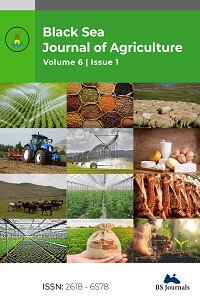
The study assessed the contribution of climate-smart agriculture to the economic empowerment of rural women in Rwanda: Gender Climate Change and Agriculture Support Programme (GCCASP), Nyaruguru, and Ngoma Districts. The study applied the mixed method including quantitative and qualitative approaches. The total population was 1121 female beneficiaries of both Districts. The sample size was 295 respondents who were selected using stratified sampling and random methods. Data collection instruments were questionnaires; and documentation reviews. Descriptive statistics methods, correlation coefficient, and regression analysis were statistical methods. Findings confirmed that it is a significant, and positive moderate correlation between the management of farms, crops, livestock, and aquaculture in climate-smart agriculture practices and economic empowerment of rural women farmers in GCCASP, Nyaruguru, and Ngoma Districts as Pearson correlation are 0.270** with a p-value of .000 less than the standard significance level of 0.01. There is a significant, and positive high correlation between Ecosystem and landscape management to conserve ecosystem services as climate-smart agriculture practices and economic empowerment of rural women farmers in GCCASP, Nyaruguru, and Ngoma Districts as a Pearson correlation is 0.735** with p-value .000, which is less than the standard significance level of 0.01, and this indicates that, out of the considered other factors of climate-smart agriculture practices, only ecosystem and landscape management to conserve ecosystem services have a significant relationship of 73.5% within economic empowerment of rural women farmers in GCCASP, Nyaruguru, and Ngoma Districts. The results also indicated the existence of a positive and very strong correlation between Services for farmers and land managers to enable them to implement the necessary changes and economic empowerment of rural women farmers in GCCASP, Nyaruguru, and Ngoma Districts as Pearson correlation is .759** with the p-value is 0.000 that is less than the standard significance level of 0.01. This indicates that out of the considered other factors that affect the economic empowerment of rural women farmers in GCCASP, Nyaruguru, and Ngoma Districts, only services for farmers and land managers to enable them to implement the necessary changes have a significant and positive relationship of 75.9% to economic empowerment of rural women farmers in GCCASP, Nyaruguru, and Ngoma Districts. The study findings generally indicated a sum Pearson Correlation of .701**with a p-value of 0.01 which is less than 0.00.
Key Words: climate-smart agriculture, economic empowerment, rural women, GCCASP



